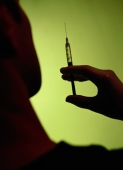- The Best Time of Day to Drink Bone Broth to Maximize Health Benefits
- 8 Ways to Increase Dopamine Naturally
- 7 Best Breads for Maintaining Stable Blood Sugar
- Gelatin vs. Collagen: Which is Best for Skin, Nails, and Joints?
- The Long-Term Effects of Daily Turmeric Supplements on Liver Health
- Could Your Grocery Store Meat Be Causing Recurring UTIs?
- Are You Making This Expensive Thermostat Error This Winter?
- Recognizing the Signs of Hypothyroidism
- 10 Strategies to Overcome Insomnia
- Could Artificial Sweeteners Be Aging the Brain Faster?
Boomers Should Consider Shingles Vaccine, Physician Says


People older than 50 can reduce their risk for developing shingles by being vaccinated against the varicella-zoster virus that causes the painful condition, an expert says.
“People who have had shingles previously can still receive the vaccine. If you are above the age of 50 years old, you should talk to your health care provider about the shingles vaccines,” advised Dr. Khalilah Babino, immediate care physician at Loyola University Health System.
Shingles is caused by the same virus responsible for chicken pox. Most people who get shingles are older than 50 because the virus can remain dormant in the body for years before being activated again, according to background information in a university news release.
People at particularly high risk for developing shingles include those who’ve had chicken pox and those with cancer, autoimmune disorders, or chronic lung or kidney disease.
An outbreak of the virus can last for several weeks. People with shingles develop a blistering rash usually in a band on one side of the body. Most often, the rash is on the chest or back.
Anyone who develops shingles on their face should seek immediate medical attention since this could result in vision loss, advised Babino, who is also an assistant professor in the department of family medicine at Loyola University Chicago Stritch School of Medicine.
“If you are diagnosed with shingles, you are contagious as long as you have blisters and ulcers,” Babino said in the news release. “Since it can be spread from person to person it is important to cover your rash and wash your hands frequently. It also is important to avoid people who have not received the chicken pox vaccine, pregnant women and anyone with a weak immune system.”
Aside from a blistering rash, people with shingles may also experience fatigue, headache, tingling, itching and burning pain.
“Fortunately, there is antiviral medication to treat shingles,” Babino noted. “The medication does not kill the virus like antibiotics kill bacteria, but they help slow the virus and speed recovery. . . I recommend starting these medications within 72 hours of the onset of rash. Since shingles can be very painful, you might also need prescription pain medication.”
Although most people with shingles don’t develop any complications from the virus, there is a 10 percent chance of developing a painful nerve condition known as postherpetic neuralgia, which can last for up to a year, the news release noted.
More information
The U.S. Centers for Disease Control and Prevention provides more information on shingles.
Source: HealthDay
Copyright © 2026 HealthDay. All rights reserved.










